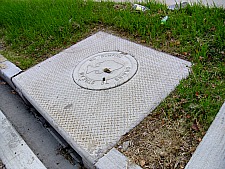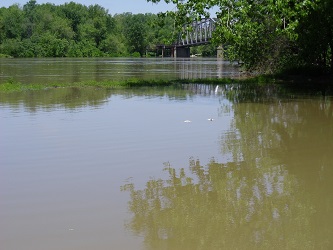Ask Your Questions About Community Environmental Issues Right Here
Last Reviewed: March 26, 2025
This page consists of a portal where you can pose questions about community environmental issues you may be facing. I am using this term very loosely, simply to mean something about the natural resource environment that a person making neighborhood activism, city planning, or community development decisions needs to know. You find the form toward the bottom of this introduction.

Even below that, you can see the questions that others have asked, and how these were answered on this website.
Before I go further, we want to say that the photo above is the No Dumping version of a stormwater inlet cover. The image of a fish is intended to remind citizens and visitors that everything that they dump into the inlet, or that travels there by way of being swept up in water, ends up in a stream.
That's just an example of many projects underway to try to educate the public about clean water. The public education aspects of the Clean Water Act in the U.S. have forced that issue. Other natural resource protection or enhancement efforts may not have found their translators who can put scientific and engineering concepts into simple terms.
Good city or
regional planning, and therefore good community development, depends on its
caretakers having an understanding of certain natural resource
principles.
These vary widely, depending on geography, geology, climate, ecosystems, land development customs, and how the legal system handles ownership of land, if indeed there is any such concept.
So it has been such a pleasure to be in the position simply to sort the items that come into the community development question page into categories, based on actual submissions. I will be glad to give some insights into your question if you can express yourself clearly-- and if I know something helpful to say! Other site visitors can add comments or information too, but all are moderated.
If you have a question about a community environmental issue relevant to you, please take time to type it into the form below. You can be anonymous if you wish. I will look forward to answering, which creates a new web page you can point to in social media if you like. In the meantime, below the form you will see what others have asked. You or some other liberal arts type that you know could find that you're not too clear on how some natural resource systems actually work. If that lack of clarity affects your community work, let me help.
Or it could be that your community is beginning to think about fairly complex environmental questions, such as climate change planning and participation in watershed planning. Those are sure to raise new questions and dilemmas.
Here I will give you just the nuts and bolts of what you must know to deal with the subject matter that you raise. There are no long scientific discussions; most of our answers will be general and applicable to readers in addition to yourself. Frankly, national governments and environmental organizations provide plenty of technical information and data, but much of that is not helpful to the neighborhood-scale leader who is hoping to get a handle on what can be done about a local problem.
I would like to help you get started. When you send a question I will answer if (a) the question is understandable, (b) it does not duplicate a question and answer already on this website, and (c) I know enough to answer! The answer appears right on this website. Don't worry; you can be completely anonymous if you wish.
I would like to help you get started. When you send a question I will answer if (a) the question is understandable, (b) it does not duplicate a question and answer already on this website, and (c) I know enough to answer! The answer appears right on this website. Don't worry; you can be completely anonymous if you wish.
Have A Question About an Environmental Concept or Problem?
Would you like to ask the other visitors and/or the editors a question? Here's your place to ask and then watch for answers and comments.
Other Questions and Answers
Click below to see contributions from other visitors, and answers.
Too much trash in and near the creek
March 18, 2025
Visitor Question: A group I'm involved with plans to try to clean out a little creek that runs right through the park in my neighborhood. …
How Can We Prevent Catastrophic Flooding?
Visitor Question: I'm finding what happened in Asheville, North Carolina in Hurricane Helene to be truly horrifying. As a minor official in my home community, …
Can we force contractors to keep down the dust?
Published: September 28, 2024
Visitor Question: I live on a busy road. The city has decided it wants to upgrade the street. Considering the number …
High Cost of Flood Insurance Is Ruining Our Neighborhood
Reviewed: May 31, 2024
Visitor Question: The cost of flood insurance has just about tripled in the last year around where I live. We did have a destructive …
City moratorium on development
Visitor Question: Is it legal for a city to have a moratorium on development? Our medium-sized city has discussed this a little bit in an open meeting …
Restrictions for land conservation
Visitor Question: I'm selling a small piece of property which has a house on it. I'm also planning to deed a 2-acre piece of land to my sister.
…
Environmental impact of large reflective solar panels
Visitor Question: Currently the world is trying to move away from conventional sources of energy. For that, a better option seems to be solar energy. …
Impact of drilling large wells on neighboring properties
Our township has just rezoned a rural area to allow high-density residential for an area where existing home are on acre lots.
All of our wells are …
Volume of runoff water
Visitor Question: When land is developed, what is the maximum area of inpermeable surface allowed for a given area of land?
A developer bought an …
Relationship of human health to the environment
Reviewed: June 17, 2024
Visitor Question: Are people healthy if the environment is healthier?
Editors' Reply: A healthy environment tends to lead …
With So Much Vacant Land, Maybe It's Time for an Urban Forest
Reviewed: June 4, 2024
Website Visitor Writes: Vacant land where there used to be industry, foreclosed houses, or old city neighborhoods seems to …
Are cities part of a watershed?
What exactly is a watershed? Are cities part of it, or does the city absorb too much water.
Editors' Reply: In a word, yes. A watershed is simply …
How do you shop around for green technology and energy savings?
I am curious to hear how people who visit this site go about finding the right company to work with for embracing renewable energy sources (solar, wind, …
- Making a Good Community >
- Community Development Questions >
- Questions about Community-Scale Environmental Issues
Join GOOD COMMUNITY PLUS, which provides you monthly with short features or tips about timely topics for neighborhoods, towns and cities, community organizations, and rural or small town environments. Unsubscribe any time. Give it a try.
